英语课程标准解读(程晓棠)
- 格式:ppt
- 大小:1.29 MB
- 文档页数:64
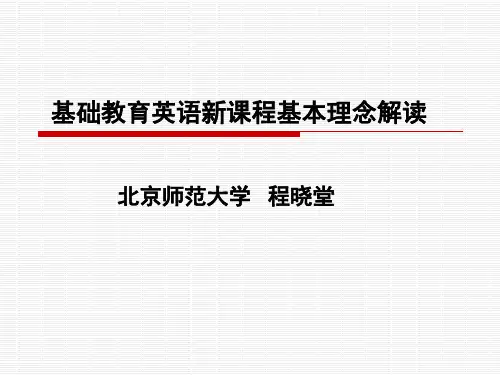


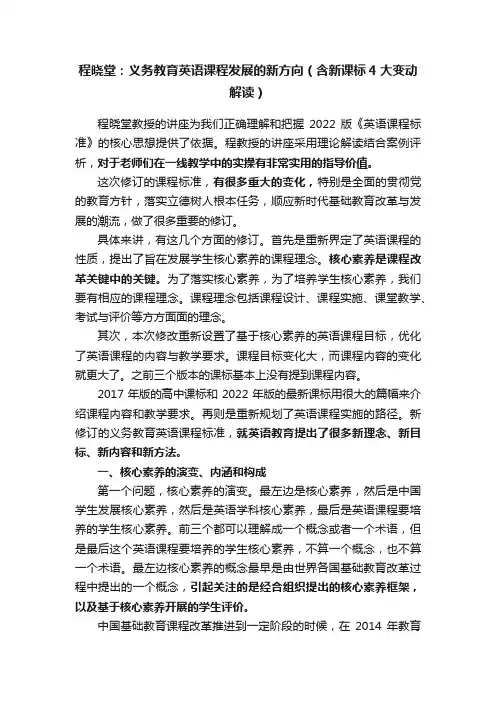
程晓堂:义务教育英语课程发展的新方向(含新课标4大变动解读)程晓堂教授的讲座为我们正确理解和把握2022 版《英语课程标准》的核心思想提供了依据。
程教授的讲座采用理论解读结合案例评析,对于老师们在一线教学中的实操有非常实用的指导价值。
这次修订的课程标准,有很多重大的变化,特别是全面的贯彻党的教育方针,落实立德树人根本任务,顺应新时代基础教育改革与发展的潮流,做了很多重要的修订。
具体来讲,有这几个方面的修订。
首先是重新界定了英语课程的性质,提出了旨在发展学生核心素养的课程理念。
核心素养是课程改革关键中的关键。
为了落实核心素养,为了培养学生核心素养,我们要有相应的课程理念。
课程理念包括课程设计、课程实施、课堂教学、考试与评价等方方面面的理念。
其次,本次修改重新设置了基于核心素养的英语课程目标,优化了英语课程的内容与教学要求。
课程目标变化大,而课程内容的变化就更大了。
之前三个版本的课标基本上没有提到课程内容。
2017 年版的高中课标和 2022 年版的最新课标用很大的篇幅来介绍课程内容和教学要求。
再则是重新规划了英语课程实施的路径。
新修订的义务教育英语课程标准,就英语教育提出了很多新理念、新目标、新内容和新方法。
一、核心素养的演变、内涵和构成第一个问题,核心素养的演变。
最左边是核心素养,然后是中国学生发展核心素养,然后是英语学科核心素养,最后是英语课程要培养的学生核心素养。
前三个都可以理解成一个概念或者一个术语,但是最后这个英语课程要培养的学生核心素养,不算一个概念,也不算一个术语。
最左边核心素养的概念最早是由世界各国基础教育改革过程中提出的一个概念,引起关注的是经合组织提出的核心素养框架,以及基于核心素养开展的学生评价。
中国基础教育课程改革推进到一定阶段的时候,在2014 年教育部启动了中国学生发展核心素养研究项目,在2016 年发布了中国学生发展核心素养框架。
从高中课标修订开始,就全面的落实核心素养。
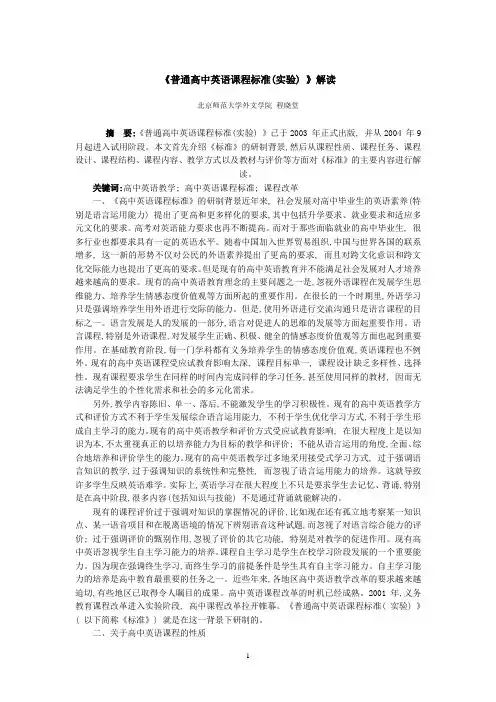
《普通高中英语课程标准(实验) 》解读北京师范大学外文学院程晓堂摘要:《普通高中英语课程标准(实验) 》已于2003 年正式出版, 并从2004 年9 月起进入试用阶段。
本文首先介绍《标准》的研制背景,然后从课程性质、课程任务、课程设计、课程结构、课程内容、教学方式以及教材与评价等方面对《标准》的主要内容进行解读。
关键词:高中英语教学; 高中英语课程标准; 课程改革一、《高中英语课程标准》的研制背景近年来, 社会发展对高中毕业生的英语素养(特别是语言运用能力) 提出了更高和更多样化的要求,其中包括升学要求、就业要求和适应多元文化的要求。
高考对英语能力要求也再不断提高。
而对于那些面临就业的高中毕业生, 很多行业也都要求具有一定的英语水平。
随着中国加入世界贸易组织,中国与世界各国的联系增多, 这一新的形势不仅对公民的外语素养提出了更高的要求, 而且对跨文化意识和跨文化交际能力也提出了更高的要求。
但是现有的高中英语教育并不能满足社会发展对人才培养越来越高的要求。
现有的高中英语教育理念的主要问题之一是,忽视外语课程在发展学生思维能力、培养学生情感态度价值观等方面所起的重要作用。
在很长的一个时期里,外语学习只是强调培养学生用外语进行交际的能力。
但是,使用外语进行交流沟通只是语言课程的目标之一。
语言发展是人的发展的一部分,语言对促进人的思维的发展等方面起重要作用。
语言课程,特别是外语课程,对发展学生正确、积极、健全的情感态度价值观等方面也起到重要作用。
在基础教育阶段,每一门学科都有义务培养学生的情感态度价值观,英语课程也不例外。
现有的高中英语课程受应试教育影响太深, 课程目标单一, 课程设计缺乏多样性、选择性。
现有课程要求学生在同样的时间内完成同样的学习任务,甚至使用同样的教材, 因而无法满足学生的个性化需求和社会的多元化需求。
另外,教学内容陈旧、单一、落后,不能激发学生的学习积极性。
现有的高中英语教学方式和评价方式不利于学生发展综合语言运用能力, 不利于学生优化学习方式,不利于学生形成自主学习的能力。


Decoding the English CurriculumStandards: Reflections on ChengXiaotang's InterpretationIn the realm of education, the English curriculum standards serve as the guiding lighthouse for teachers and learners alike. They outline the expected outcomes, skills, and knowledge that students should acquire throughout their academic journey. Among the many voices that have interpreted these standards, Cheng Xiaotang's approach stands out for its clarity, depth, and practicality. Reading his insights on the English curriculum standards has been an eye-opening experience, sparking both reflection and inspiration.Cheng Xiaotang's interpretation is remarkable for its holistic approach. He doesn't just focus on the linguistic aspects of the curriculum but also considers the cultural, cognitive, and affective dimensions. This holistic perspective is crucial in today's interconnected world, where understanding other cultures andperspectives is as important as mastering the language itself. His emphasis on communication skills, critical thinking, and cultural awareness is particularly relevant in today's globalized context.Another noteworthy aspect of Cheng Xiaotang's interpretation is his emphasis on the importance of active learning. He argues that students need to be actively engaged in the learning process, not just passive recipients of knowledge. This active learning approach is essential for fostering a love of learning and encouraging students to take ownership of their education. It also aligns with current educational trends that promote student-centered teaching methods.The emphasis on technology integration is also a standout feature of Cheng Xiaotang's interpretation. He recognizes the role of technology in enhancing language learning and encourages teachers to experiment with digital tools and resources. This integration not only makes learning more engaging and fun but also prepares students for the digital world they will encounter in their future careers.Moreover, Cheng Xiaotang's interpretation is highly practical, offering teachers concrete strategies and techniques to implement the curriculum standards effectively. This practicality is particularly valuable for teachers who might find the standards abstract or daunting. His suggestions on how to design lessons, assess student progress, and create a supportive learning environment are invaluable resources for any teacher seeking to improve their practice.In summary, Cheng Xiaotang's interpretation of the English curriculum standards is a comprehensive, practical, and forward-thinking guide for teachers and learners. It offers a holistic perspective, emphasizes active learning, and integrates technology seamlessly into the learning process. His insights have not only deepened my understanding of the curriculum standards but have also sparked new ideas and inspired me to experiment with new teaching methods. Reading his work has been a truly rewarding experience, one that I highly recommend to any educator interested in improving their practice and enhancing their students' learning experiences.**《英语课程标准解读》程晓堂读后感**在教育的领域中,英语课程标准犹如一盏指路的明灯,为教师和学生提供了明确的方向。

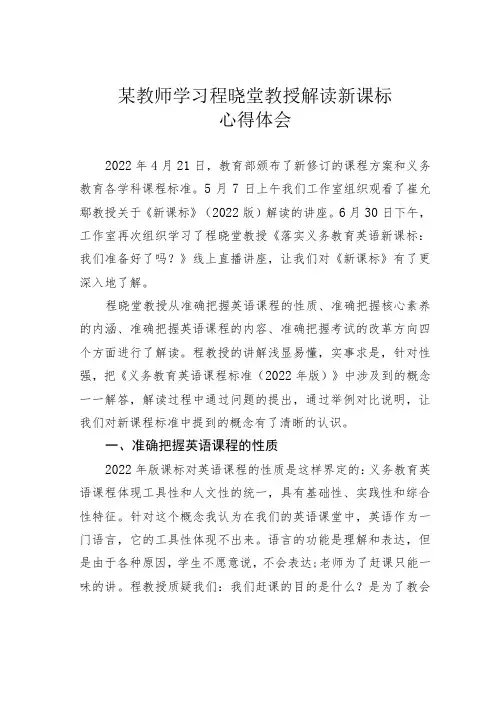
某教师学习程晓堂教授解读新课标心得体会2022年4月21日,教育部颁布了新修订的课程方案和义务教育各学科课程标准。
5月7日上午我们工作室组织观看了崔允鄢教授关于《新课标》(2022版)解读的讲座。
6月30日下午,工作室再次组织学习了程晓堂教授《落实义务教育英语新课标:我们准备好了吗?》线上直播讲座,让我们对《新课标》有了更深入地了解。
程晓堂教授从准确把握英语课程的性质、准确把握核心素养的内涵、准确把握英语课程的内容、准确把握考试的改革方向四个方面进行了解读。
程教授的讲解浅显易懂,实事求是,针对性强,把《义务教育英语课程标准(2022年版)》中涉及到的概念一一解答,解读过程中通过问题的提出,通过举例对比说明,让我们对新课程标准中提到的概念有了清晰的认识。
一、准确把握英语课程的性质2022年版课标对英语课程的性质是这样界定的:义务教育英语课程体现工具性和人文性的统一,具有基础性、实践性和综合性特征。
针对这个概念我认为在我们的英语课堂中,英语作为一门语言,它的工具性体现不出来。
语言的功能是理解和表达,但是由于各种原因,学生不愿意说,不会表达;老师为了赶课只能一味的讲。
程教授质疑我们:我们赶课的目的是什么?是为了教会学生么?不,大多数教师是为了完成教学任务而赶课。
我的工作不应该是教会同学们知识吗?如果说一味的为了完成自己的任务,那么我们的课程还有什么意义?其实在教课过程中,老师也通过一系列的活动调动同学的学习积极性,通过鼓励,激发同学们的表达能力;但是,收效甚微。
所以,我觉得我们应该重新去认识我们的课堂,我们的目的是教会学生用英语语言去表达,让他能够在日常生活中英语去表达,而不仅仅只是为了考试答题,针对这一点我感触颇深。
在我结束的这个学期中,每天都在备课,做题,讲课,讲题。
但是我却最终忽视了学生到底学到了一些什么?这是我要反思,并正视的一个问题。
英语学习是为了让学生们在以后的学习、生活和工作中使用的,而不仅仅是为了完成一张卷子。
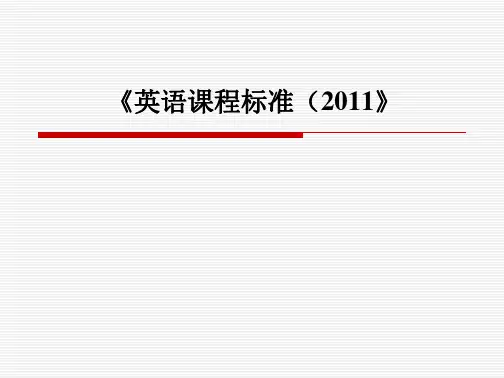
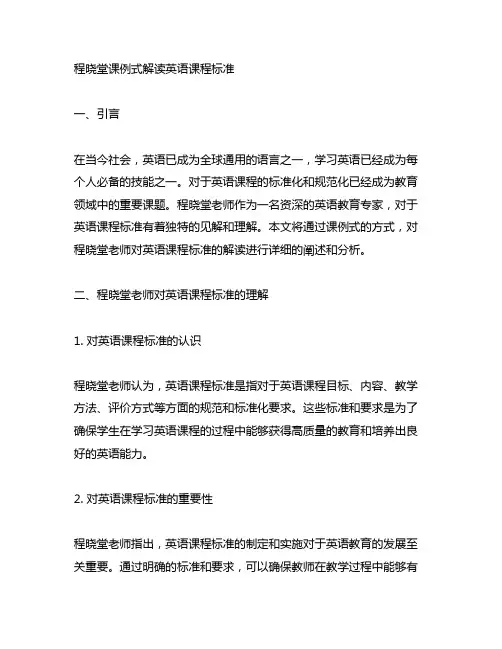
程晓堂课例式解读英语课程标准一、引言在当今社会,英语已成为全球通用的语言之一,学习英语已经成为每个人必备的技能之一。
对于英语课程的标准化和规范化已经成为教育领域中的重要课题。
程晓堂老师作为一名资深的英语教育专家,对于英语课程标准有着独特的见解和理解。
本文将通过课例式的方式,对程晓堂老师对英语课程标准的解读进行详细的阐述和分析。
二、程晓堂老师对英语课程标准的理解1. 对英语课程标准的认识程晓堂老师认为,英语课程标准是指对于英语课程目标、内容、教学方法、评价方式等方面的规范和标准化要求。
这些标准和要求是为了确保学生在学习英语课程的过程中能够获得高质量的教育和培养出良好的英语能力。
2. 对英语课程标准的重要性程晓堂老师指出,英语课程标准的制定和实施对于英语教育的发展至关重要。
通过明确的标准和要求,可以确保教师在教学过程中能够有明确的目标和方向,学生在学习过程中也可以更好地掌握知识和技能,提高英语水平。
3. 对英语课程标准的内容程晓堂老师认为,英语课程标准应该包括课程的目标和要求、教学内容和教学方法、学生的评价方式和标准等内容。
这些内容应该是全面的、科学的、合理的,能够真正反映出学生在学习过程中应该具备的能力和素质。
三、程晓堂老师课例式解读英语课程标准1. 课例一:听力教学程晓堂老师在听力教学中,注重培养学生的听力理解能力,通过多样化的听力材料和真实语境的听力内容,帮助学生提高听力技能。
她还注重培养学生的听力策略,教会学生如何提高听力效率和准确度。
在评价方面,程晓堂老师注重对学生听力水平的全面评价,包括听力准确度、理解能力、听力策略等方面。
2. 课例二:口语教学在口语教学中,程晓堂老师注重培养学生的口头表达能力,通过丰富多彩的口语练习和角色扮演活动,帮助学生提高口语技能。
她还注重培养学生的口语交际能力,教会学生如何在真实的语境中进行口语交际。
在评价方面,程晓堂老师注重对学生口语能力的全面评价,包括口语流利度、词汇丰富度、语音准确度等方面。
在点击访问文字中,程晓堂义务教育英语课程标准解析这一书籍,作者以一位资深教育专家的身份,对我国义务教育英语课程标准进行了深入剖析,其读后感颇有引起人思考的价值。
在此篇文章中,我将对这本书的内容进行全面评估,并撰写一篇深度和广度兼具的中文文章,以帮助你更好地理解和领悟这一主题。
程晓堂在书中详细解析了我国义务教育英语课程标准的制定历程、内涵和实施情况。
他对课程标准的过去、现在和未来进行了系统的比较和分析,阐述了课程标准的重要性和作用。
通过他的分析,我们可以深刻理解到课程标准对提高教育教学质量、促进教育公平以及培养学生综合能力的重大意义。
程晓堂对义务教育英语课程标准的具体内容进行了逐条解读和评析。
他对各个年级的课程要求、教学内容和评价标准进行了详细分析,提出了一些值得我们深思的观点和建议。
通过他的具体解析,我们可以更好地把握课程标准的核心要义,从而更好地指导教学实践和教学改革。
程晓堂在书中还结合了自己的教学经验和研究成果,对提高英语教学质量提出了一些具体措施和建议。
他强调了教师的专业素养和教学方法的灵活运用,指出了学生的学习动机和自主学习能力的培养,以及学校和家庭的配合等因素对英语教学的重要影响。
通过他的经验共享和建议提出,我们可以更深入地了解到如何提高英语教学效果和促进学生全面发展。
在总结和回顾性的内容方面,程晓堂在书中对义务教育英语课程标准的价值和作用进行了全面的总结和回顾。
他指出了课程标准对推动英语教育改革和发展的重大作用,强调了课程标准对提高学生综合素质和促进教育公平的重要意义。
通过他的总结和回顾,我们可以更全面、深刻和灵活地理解课程标准的意义和价值。
我个人认为,《程晓堂义务教育英语课程标准解析》这本书不仅在解析义务教育英语课程标准的内容上具有很高的价值,而且在教育理念和实践经验上也有着丰富的内涵。
作者的观点独到、逻辑清晰,对课程标准进行了全面且深入的分析,对教育教学实践也提出了有益的建议。
我认为这本书对于英语教学工作者、教育研究者和决策者都具有重要的参考价值。
重磅干货!看梅德明、王蔷、程晓堂等6位专家如何解读英语新课标导语《义务教育英语课程标准(2022年版)》颁布,新课标以坚持目标导向、坚持问题导向、坚持创新导向为原则,在义务教育阶段首提核心素养,围绕核心素养确定了新的课程目标和内容,对义务教育阶段的课程教学提出了新的要求。
作为教材编写和考试改革的重要指导材料,新课标的落地与广大师生息息相关。
那么2022版英语课程标准主要有哪些要点呢?英语教师该如何从课程理念走向教学实践呢?来看六位英语专家对新课标的权威解读。
01梅德明上海外国语大学教授,国家教材委员会专家委员会委员,教育部义务教育英语课程标准修订组组长,中国学术英语教学研究会副会长。
关键词1:“教—学—评”一体化义务教育英语课程要求“教—学—评”一体化,倡导形成性评价与终结性评价相结合的评价理念,探索主体多元、方式多样、素养导向的评价体系。
“教—学—评”一体化本质上是一种关注学生核心素养发展的评价观,具有鲜明的育人价值导向,要求在考查学生语言能力的同时,重视考查学生的文化意识、思维品质和价值取向,确保评价目的与学生核心素养发展目标一致。
来源:《21世纪英语教育》2022年5月刊关键词2:育人导向和价值一定要明确英语课程的育人导向和价值,很多教师对内容的关注比较多,而相对忽视内容的育人导向、结果和价值。
义教课标明确了义务教育英语课程致力于培养有理想、有本领、有担当的时代新人,旨在引导学生坚定理想信念,厚植爱国主义情怀,初步具备人类命运共同体和全人类共同价值意识,具有家国情怀、国际视野和一定跨文化沟通与交流能力。
来源:《21世纪英语教育》2022年5月刊关键词3:九年一体化及衔接这次课标修订在坚持九年一体化设计的同时,注重前后左右的衔接贯通。
一是幼小衔接。
要科学评估学前教育结束后学生在健康、语言、社会、科学、艺术等领域的发展水平,合理设计小学低年级课程,内容坡度要减缓,学习方式要注重活动化、游戏化、生活化。
专家分享程晓堂:高中英语学业质量标准研究《普通高中英语课程标准(2017年版)》的第五部分为“学业质量”。
该部分以学业质量标准的形式明确了高中生通过英语学习应该达到的学业质量水平。
这一部分的篇幅并不长,但是意义重大。
这是自2001年以来四个版本的英语课程标准首次明确提出学业质量标准。
另外,学业质量标准与考试评价密切相关,而且是英语学业水平考试和英语高考命题的重要依据。
因此,英语学业质量标准的提出,引起了学界和社会的广泛关注。
本文重点探讨研制高中英语学业质量标准的意义,并进一步阐释英语学业质量标准的定位和功能。
一、研制学业质量标准的背景和意义在探讨高中英语学业质量标准相关问题之前,笔者首先简要梳理学业质量标准的来龙去脉。
对于中国教育界来说,“学业质量标准”是一个相对较新的概念。
从国外教育界来看,研制和应用学业质量标准的历史也并不长。
总体来看,与课程标准类似,学业质量标准也是教育改革中“标准运动”(standards movement)的产物之一,经常与课程标准的研制与使用联系在一起。
(一)学业质量标准产生的国际背景在过去相当长的时期里,教育普遍被认为最缺乏标准的领域。
虽然国家和学校都有教学计划、教学大纲、课程设置等,但具体教学内容与要求往往没有统一的规定。
其结果是教育教学的内容存在零散、随机的倾向。
不同学校的学生所学内容有很大差异;一个国家不同地区的学生所学内容也不尽相同。
另外,就特定的教学内容而言,学生应该学多少、学多深、学多好,也没有统一的要求或规定。
在中国,往往通过相对统一的教材来实现教学内容的统一。
而在西方国家,很少采用统一的教材,有些学校甚至不采用商业化出版的教材。
当然,教育本身确实不应该一刀切,不能让所有学生以相同的方式和进度学习完全相同的内容,也不能要求或期待所有学生取得相同的学习结果。
但是,作为社会生活的一个重要组成部分,作为推动社会发展和人类进步的重要动力,教育也应该有其基本规律,学生接受教育时肯定需要学习一些共同的内容。